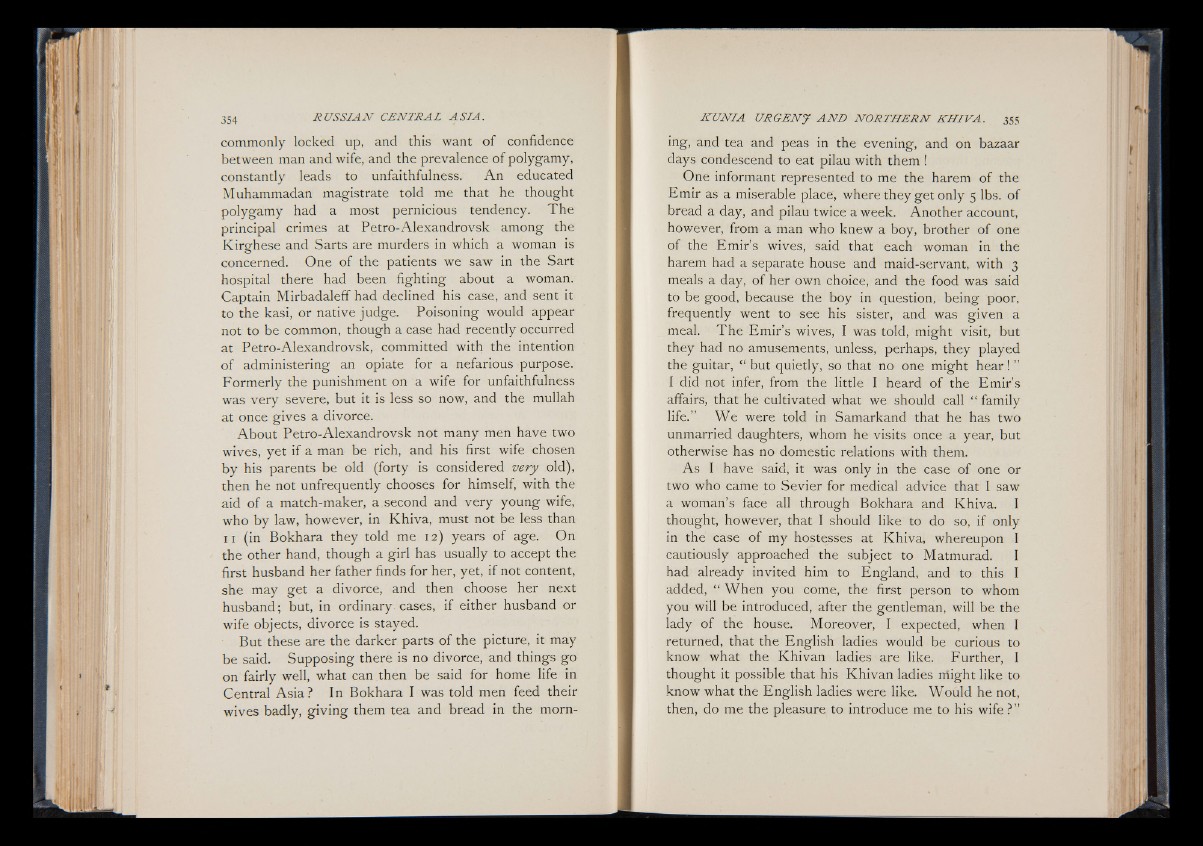
commonly locked up, and this want of confidence
between man and wife, and the prevalence of polygamy,
constantly leads to unfaithfulness. An educated
Muhammadan magistrate told me that he thought
polygamy had a most pernicious tendency. The
principal crimes at Petro-Alexandrovsk among the
Kirghese and Sarts are murders in which a woman is
concerned. One of the patients we saw in the Sart
hospital there had been fighting about a woman.
Captain Mirbadaleff had declined his case, and sent it
to the kasi, or native judge. Poisoning would appear
not to be common, though a case had recently occurred
at Petro-Alexandrovsk, committed with the intention
o f administering an opiate for a nefarious purpose.
Formerly the punishment on a wife for unfaithfulness
was very severe, but it is less so now, and the mullah
at once gives a divorce.
About Petro-Alexandrovsk not many men have two
wives, yet if a man be rich, and his first wife chosen
by his parents be old (forty is considered very old),
then he not unfrequently chooses for himself, with the
aid of a match-maker, a. second and very young wife,
who by law, however, in Khiva, must not be less than
i i (in Bokhara they told me 12) years of age. On
the other hand, though a girl has usually to accept the
first husband her father finds for her, yet, if not content,
she may get a divorce, and then choose her next
husband; but, in ordinary, cases, if either husband or
wife objects, divorce is stayed.
But these are the darker parts of the picture, it may
be said. Supposing there is no divorce, and things go
on fairly well, what can then be said for home life in
Central Asia? In Bokhara I was told men feed their
wives badly, giving them tea and bread in the morning,
and tea and peas in the evening, and on bazaar
days condescend to eat pilau with them !
One informant represented to me the harem of the
Emir as a miserable place, where they get only 5 lbs. of
bread a day, and pilau twice a week. Another account,
however, from a man who knew a boy, brother of one
of the Emir’s wives, said that each woman in the
harem had a separate house and maid-servant, with 3
meals a day, of her own choice, and the food was said
to be good, because the boy in question, being poor,
frequently went to see his sister, and was given a
meal. The Emir’s wives, I was told, might visit, but
they had no amusements, unless, perhaps, they played
the guitar, “ but quietly, so that no one might h e a r ! ”
I did not infer, from the little I heard of the Emir’s
affairs, that he cultivated what we should call “ family
life.” We were told in Samarkand that he has two
unmarried daughters, whom he visits once a year, but
otherwise has no domestic relations with them.
As I have said, it was only in the case of one or
two who came to Sevier for medical advice that I saw
a woman’s face all through Bokhara and Khiva. I
thought, however, that I should like to do so, if only
in the case of my hostesses at Khiva, whereupon I
cautiously approached the subject to Matmurad. I
had already invited him to England, and to this I
added, “ When you come, the first person to whom
you will be introduced, after the gentleman, will be the
lady of the house. Moreover, I expected, when I
returned, that the English ladies would be curious to
know what the Khivan ladies are like. Further, I
thought it possible that his Khivan ladies rrlight like to
know what the English ladies were like. Would he not,
then, do me the pleasure to introduce me to his wife ?”